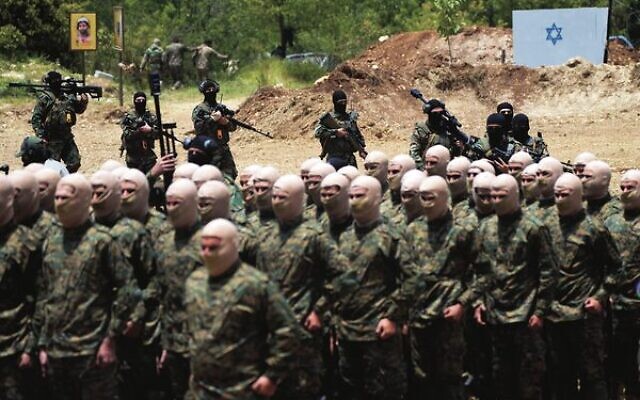Israel and Hezbollah: A known routine which can take the wrong turn
'There is a common understanding by Israel's enemies, that any aggression will re-galvanise the Israeli public and play to the hands of Netanyahu and his right-wing government'

Recent weeks have seen a high volume of tactical incidents and mutual threats being exchanged between Israel and Hezbollah, raising speculations and fears regarding a close war between the two.
The second Lebanon war of 2006 is an experience neither side would like to revive. The devastating damage to Lebanon, and the Shia population in particular, alongside accusations aimed at Nasrallah, Hezbollah’s leader, of being “the destructor of Lebanon” (in a paraphrase on his claim to be the “protector of Lebanon”), are still strong and vivid memories in Beirut. The latest threats by the Israeli Defence Minister to “return Lebanon to the Stone Age” if Hezbollah dares to attack Israel, are loud and clear.
In the last years Israel has carried out several military and diplomatic moves, which curbed Hezbollah legitimacy and capabilities to initiate an attack. In 2018, the IDF exposed and destroyed secret underground tunnels dug by Hezbollah, which were meant to allow its fighters to cross the border undetected as part of a surprise attack. In the following years, Israel has built a complex barrier along the border to prevent and foil an above-ground attempt to cross into its territory.
By the end of 2022, Israel and Lebanon signed an indirect agreement, brokered by the US, to settle a longstanding maritime dispute between the two countries. The agreement decreased Hezbollah’s legitimacy to challenge Israel, legitimacy which was already limited and disputed by its rivals in Beirut. With weakened internal legitimacy, disturbed operational plans and clear massages from Israel, Hezbollah’s leadership knows very well that another war with Israel will cost it dearly.
Iran, Hezbollah’s sponsor, has invested huge amounts of money since 2006 to rebuild the organisation’s military capabilities with the aim of using it as a deterrence tool to prevent an Israeli attack on Tehran’s nuclear project. Pushing Hezbollah into a war with Israel now will deprive Iran of a critical strategic instrument which plays a part in a much bigger campaign. If Hezbollah is a “one time bullet”, it should be used at the right time and only for its intended purpose.
These elements are the cornerstone Hezbollah’s cautious and well-calculated years-long policy when it comes to the use of force along the Israeli-Lebanese border.
Under these circumstances, symbolic shows of force and inflammatory rhetoric are routine during the period of the annual Memorial Day of the 2006 war during the months of July and August.
Being an avid analyst of Israeli politics, Nasrallah must know very well that the one thing which might reunite Israel’s domestic arena is an external threat. A recent meeting between Iranian officials and members of Palestinian militant groups reached the same conclusion: the Israeli domestic political crisis should not be exploited to attack Israel.
It seems there is a common understanding by Israel’s enemies, that any aggression in the current situation will re-galvanise the Israeli public and play to the hands of Netanyahu and his right-wing government.
Nevertheless, IDF generals claim in recent months that the restrained and well-controlled Nasrallah which Israel has known for years, might be willing to take new risks and turn to a more adventurous policy. Their recommendation to the Israeli government was that Hezbollah’s tactical provocations along the border should be contained, as Israel has no interest in being dragged into an armed conflict with the organisation.
There is one problem with those rational and well-based recommendations – they assume that Hezbollah, and particularly Nasrallah, are the ones running the show on the other side of the border.
It should be noted that the most alarming claim by the IDF generals, is that Nasrallah himself was not even involved in some of the incidents along the border in recent months. It was Hamas which launched the unprecedented salvo of rockets into Israel last April without Hezbollah’s knowledge, and it was Hezbollah field operatives themselves who initiated at least some of the provocations near the border. The presence of civilians and armed Lebanese military men in the area adds another source of potential friction.
It is unlikely that Hezbollah’s leadership will order an all-out surprise attack on Israel, but tactical provocations in combination with the limited control over the local elements along the Lebanese side of the border, might lead to an unwanted incident that can rapidly escalate.
Even under the IDF recommendation to the Israeli government to adopt a containment policy, the ongoing incidents – let alone a provocation that will cause casualties on the Israeli side – might be used by radical right-wing ministers in Jerusalem to call for a harsh and decisive IDF response. From there, in a similar way to the events which led to the 2006 war, a spiralling cycle of violence is all but imminent.
Dror Doron is a senior political analyst specialising in the Middle East, who has worked for the last 17 years for the Israeli government as a research and analysis expert. He lives in Australia.

comments